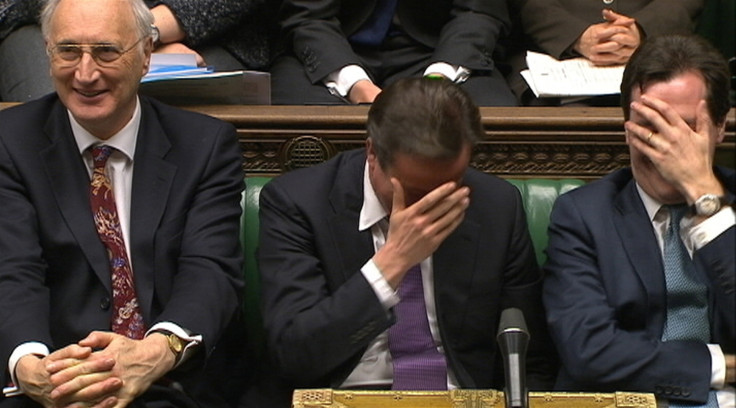David Cameron and Russell Brand: The Comment That Draws a Wayward Line Between Politician and Comedian

There was a time, I'm assured, when Punch and Judy politics were reserves for midday on Wednesdays.
Now, though, the world of political debate has become an ever-reductive race to the bottom. Serious and reasoned comment is a thing of the past. Snappy and reactionary soundbites have graduated from Prime Minister's Questions and now seem to be the vehicle for delivering reactionary policy news du jour.
The internet, and more specifically social media, has been great for the world in many ways. The fact that it gives everybody – no matter how insignificant they seem – a platform from which to espouse their views is, ostensibly, a good thing.
But, when the prime minister of the United Kingdom sees it as a means of telling his blood-baying electorate that he's refusing to pay the country's bills, you have to question the role it plays in politics.
"I'm angry at the sudden presentation of a €2bn bill to the UK by the EU. It's an appalling way to behave and I won't be paying it on Dec 1<sup>st," read a tweet from David Cameron's official Twitter account just after 2pm on Friday (24 October).
The comment was in response to the news that the European Union is seeking more contributory payments from the UK because of its better-than-expected-economic performance. Germany, which is experiencing an unexpected economic downturn, will get a rebate on what it has already contributed to Brussels' coffers.
I'm angry at the sudden presentation of a €2bn bill to the UK by the EU. It's an appalling way to behave and I won't be paying it on Dec 1st
— David Cameron (@David_Cameron) October 24, 2014Just to be clear, those are the rules that Britain signed up to when it joined the EU. The figure – actually €2.1bn – was based on new methods used by Eurostat for calculating member states' gross national income since 1995. It has revised its evaluation of how well the UK economy has performed over the past 19 years.
That is the price of success (which the coalition of course will not mention, since it is the success of the previous government). Them's the breaks.
Not only is Cameron's comment infantile and ill-judged – to the rest of Europe, it will be recorded as a very public tantrum – it is representative of the wider polarisation of British politics. The growing popularity of Ukip, riding on a wave of anti-EU and anti-immigrant sentiment, has forced both Labour and the Conservatives to "get tough" on both, pandering to the ill-conceived but sadly widespread view that everything wrong with Britain today is the fault of "the other".
Russell Brand Has His Say on Council Tax
On the other side of the political debate, we have Russell Brand (or should that be Brand Russell?), urging young people not to vote and – if they do not fancy it – to not bother paying their bills or taxes.
There seems to be no appetite for the middle ground anymore (which is perhaps a reflection on how those occupying this territory in recent years are perceived to have failed the masses) but with today's message to Brussels, Cameron and Brand may have found themselves as unlikely bedfellows.
There's a lineage of irresponsibility between Brand telling people to tear up their council tax final demand letters and Cameron saying he refuses to pay a bill the UK has been hit by because of its improved financial position.
Getting a pay rise at work is often tempered by the realisation that a hefty chunk of it will go towards a tax bill that rises in correlation. What is Cameron's message to be read as, if not that you can pick and choose which levies to pay, based on whether you agree with them or not?
I half expect to see Cameron's tweet appear in a future Buzzfeed quizicle entitled: Who said it, Russell Brand or David Cameron?
Note: the irony of a polemical rant about the polemical of British politics is not lost on the writer of this article.
© Copyright IBTimes 2024. All rights reserved.






